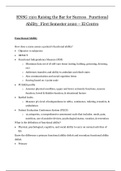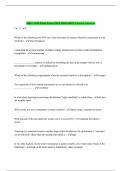RNSG 1301 Raising the Bar for Success_ Functional Ability _First Semester 2020 – El Centro Functional Ability How does a nurse assess a patient’s functional ability? • Objective vs subjective • IMPACT • Functional Independence Measure (FIM) o Minimum data set of 18 self-care items (eating, bathing, grooming, dressing, etc) o Addresses transfers and ability to ambulate and climb stairs o Also communication and social cognition items o Scoring based on 7-point scale • PULSES profile o Assesses physical condition, upper and lower extremity functions, sensory function, bowel & bladder function, & situational factors • Barthel Index o Measure pt’s level of independence in ADLs, continence, toileting, transfers, & ambulation • Patient Evaluation Conference System (PECS) o 15 categories, a comprehensive assessment scale that includes: meds, pain, nutrition, use of assistive devices, psychological status, vocation, & recreation What is the definition of functional ability? • Physical, psychological, cognitive, and social ability to carry on normal activities of life Know the difference a primary functional ability deficit and secondary functional ability deficit. • Primary o Genetic, injury, trauma, or disease in early life ▪ Autism, cerebral palsy, fetal alcohol syndrome, Down, Duchennes’ MD, malnutrition, fetal drug exposure • Secondary o Progressive, musculoskeletal, or neurological ▪ MS, rheumatoid arthritis, CVA, Parkinson’s, Alzheimer’s What is the difference between Basic Activities of Daily Living and Instrumental Activities of Daily Living? • Basic – personal care and mobility o Eating, bathing, dressing, & toileting • Instrumental – complex skills needed to live in community o Housekeeping, meal prep, finances, & transportation How does age relate to functional ability? • Older age a risk factor for impaired functional ability How does sensory perception relate to functional ability? • In order to properly carry out basic and instrumental, sensory perception needs to be intact or safety issues could arise. How does having poor vision affect a person’s ability to function? • Lack of vision impairs the patient’s ability to properly carry out I/B ADLs • Coping with vision loss can be difficult • Strategies for adapting to environment is needed for carrying out ADLs. • Assistance (people or devices) might be needed What are the domains of function al ability and how do they relate to patient care? • Psychological – coping, manage relationships • Physical – mobility, driving, cleaning, cooking





